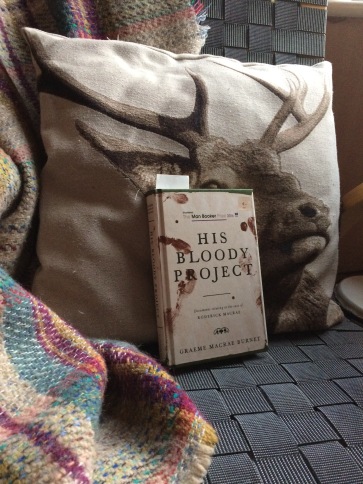2 min read
This novel was one of the six titles shortlisted for this year’s Man Booker prize (and one that I did not get to before the winner was announced on the 26th of October). I wasn’t especially looking forward to it (possibly why I left it almost to last); crime fiction is not one of my chosen genres (though I’ve reviewed Frances Brody on this blog, and I like a bit of Agatha Christie now and then). Also, the typeface is quite small and there aren’t any chapters! Pathetic, I know, but I think most keen readers have their little quirks.
 I have to say, though, that it’s a totally gripping story. Roddy Macrae is the 17-year old son of a crofter in a small village in the Scottish Highlands. The book begins with five short police statements from different witnesses who later testify in Roddy’s trial. They recount the incident, in August 1869, when Roddy murdered three other residents of the village: Lachlan Mackenzie, the village Constable and long-time foe of Roddy’s father, Mackenzie’s teenage daughter, Flora, and his young son Donnie. These witnesses observed Roddy walking through the village covered in blood and in addition to their account of the events they saw, they make observations on his character and background. Thus, there is little doubt that Roddy carried out the triple murder and the scene is set for an account of how these events came to pass.
I have to say, though, that it’s a totally gripping story. Roddy Macrae is the 17-year old son of a crofter in a small village in the Scottish Highlands. The book begins with five short police statements from different witnesses who later testify in Roddy’s trial. They recount the incident, in August 1869, when Roddy murdered three other residents of the village: Lachlan Mackenzie, the village Constable and long-time foe of Roddy’s father, Mackenzie’s teenage daughter, Flora, and his young son Donnie. These witnesses observed Roddy walking through the village covered in blood and in addition to their account of the events they saw, they make observations on his character and background. Thus, there is little doubt that Roddy carried out the triple murder and the scene is set for an account of how these events came to pass.
The rest of the novel is split into three parts. The first part, and the bulk of the book, is Roddy’s ‘memoir’, penned whilst in gaol, at the behest of his lawyer. It sets the scene beautifully for us, describes his family circumstances, including the death of his mother, their humble lifestyle barely scraping a living from crofting, and the relationship the family has with Lachlan Mackenzie. There is clear enmity between the two families and when Mackenzie is appointed as the local Constable (a kind of policing role, enforcing various regulations about use of the land), he sets about a campaign of persecution, targeted particularly at Roddy and his father.
From the outset, Roddy is a sympathetic character with whom the reader can identify: he is considered highly intelligent by his schoolmaster, he has a certain modern-day brio about him, challenging unfairness, and he crosses the strict boundaries of class and social status which, it is clear from his account, are central to the order of the rural community. At the same time we are presented with a decidedly unromantic picture of Highland life; it is not windswept, heather-strewn and outdoorsy. It is back-breaking and relentless, there is extreme poverty, malnutrition, suggestions of incest, and sexual exploitation. The Church, which dominates the lives of many through fear and guilt, is nasty and overweening. When Roddy’s schoolmaster goes to Mr Macrae asking that Roddy be given the chance to continue his education to fulfil his undoubted potential he is told “We have no use for opportunities here”. Life is about survival.
Roddy’s memoir ends with an account of the killings. The second part of the book is an account by an eminent criminal psychologist, called in to examine and assess Roddy for the purposes of preparing a defence. This is extraordinary in giving an insight to the mindset and attitudes of the professional medical class at that time. The final part is an account of the trial itself. I thought this third section would be a little dry, but it is in fact, totally gripping. It reminded me of the brilliant TV series The People v. OJ Simpson, from earlier this year – you know how it’s going to end, but it still feels full of suspense!
So, all in all, a really excellent book, I think, though I know it has had mixed reactions from other readers. It’s very visceral, brilliantly conceived and written, and evokes a powerful sense of time and place. I recommend it highly.
What did you think of this book?
I publish posts once or twice weekly. If you enjoyed reading this blog post and would like to keep up to date with future posts, please subscribe by clicking on the button below or in the right hand column (depending on your device).

I just loved this book! It was an easy engaging read. I couldn’t put it down and read it in a day. It’s been a month or so since I read it and I still ponder on it and may read it again soon. I loved it!
LikeLike
So glad you enjoyed it too. It’s a great read.
LikeLike